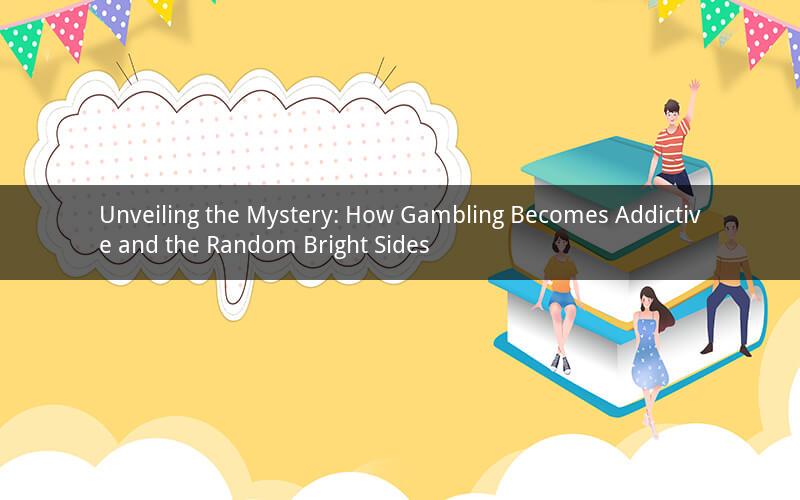
Gambling has been a popular form of entertainment for centuries, captivating individuals with its thrill and potential for big winnings. However, what lies behind the allure of gambling, and why does it often lead to addiction? This article aims to explore the reasons behind gambling addiction and shed light on the random bright sides that some individuals experience.
The Allure of Gambling
The allure of gambling lies in its ability to evoke a sense of excitement and anticipation. The act of placing a bet and waiting for the outcome creates a thrilling experience that can be highly addictive. Several factors contribute to the allure of gambling:
1. The Potential for Big Wins: One of the primary reasons people are drawn to gambling is the chance to win significant amounts of money. The allure of hitting the jackpot or winning big at a game of chance can be irresistible.
2. The Element of Risk: Gamblers are often attracted to the thrill of taking risks and facing uncertainty. The unpredictable nature of gambling creates a sense of excitement and adventure.
3. The Social Aspect: Many gambling activities, such as playing poker or visiting casinos, involve social interaction. The social aspect of gambling can enhance the overall experience and make it more enjoyable.
The Psychological Roots of Gambling Addiction
While gambling can be a fun and entertaining activity, it can also lead to addiction. Understanding the psychological roots of gambling addiction is crucial in addressing the issue effectively. Here are some factors that contribute to the development of gambling addiction:
1. Dopamine Release: The act of gambling triggers the release of dopamine, a neurotransmitter associated with pleasure and reward. Over time, individuals may develop a tolerance to the dopamine rush, leading to a stronger urge to gamble to experience the same level of pleasure.
2. Cognitive Biases: Gamblers often exhibit cognitive biases, such as the overestimation of their chances of winning or the belief that they can control the outcome of the game. These biases can make individuals more susceptible to gambling addiction.
3. Emotional Distress: People who are dealing with emotional distress or seeking an escape from reality may turn to gambling as a form of self-medication. The temporary relief from negative emotions can reinforce the habit and lead to addiction.
The Random Bright Sides of Gambling
While gambling addiction is a significant concern, it is essential to acknowledge the random bright sides that some individuals experience. These positive aspects can provide a balanced perspective on the topic:
1. Social Connection: Engaging in gambling activities, particularly in casinos or online communities, can foster social connections and friendships. This social aspect can have positive psychological effects on individuals.
2. Skill Development: Certain gambling games, such as poker or blackjack, require strategic thinking and skill. Engaging in these games can help individuals develop critical thinking and decision-making abilities.
3. Financial Gains: While the odds are often stacked against the gambler, there is always a chance of winning substantial amounts of money. For some individuals, gambling has provided financial opportunities that have changed their lives.
Frequently Asked Questions
1. What are the signs of gambling addiction?
Gambling addiction can manifest in various ways, including preoccupation with gambling, increased time spent on gambling activities, financial difficulties, and neglect of personal responsibilities.
2. Can gambling addiction be treated?
Yes, gambling addiction can be treated through various methods, including therapy, counseling, and support groups. It is crucial to seek professional help if you suspect you or someone you know is struggling with gambling addiction.
3. Is it possible to enjoy gambling without becoming addicted?
Absolutely. The key is to gamble responsibly and set limits for yourself. Staying aware of the risks and maintaining control over your gambling activities can help prevent addiction.
4. How can I overcome a gambling addiction?
Overcoming a gambling addiction requires determination and support. Seeking professional help, attending support groups, and developing healthy coping mechanisms can aid in the recovery process.
5. Can gambling addiction affect family and friends?
Yes, gambling addiction can have a significant impact on family and friends. It can lead to strained relationships, financial difficulties, and emotional distress. Support and understanding from loved ones can be crucial in overcoming addiction.
In conclusion, gambling can be both an enjoyable and addictive activity. Understanding the psychological roots of gambling addiction and acknowledging the random bright sides can provide a comprehensive view of the topic. By promoting responsible gambling and seeking help when needed, individuals can enjoy the entertainment aspect of gambling without falling into the trap of addiction.